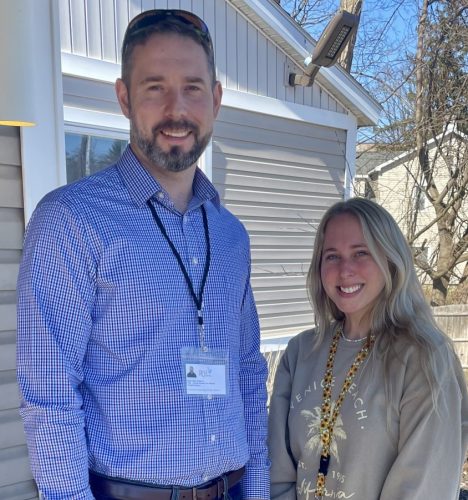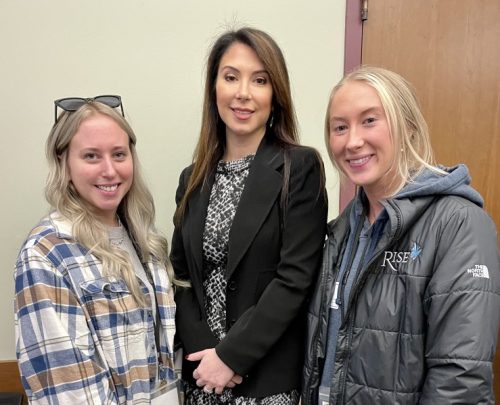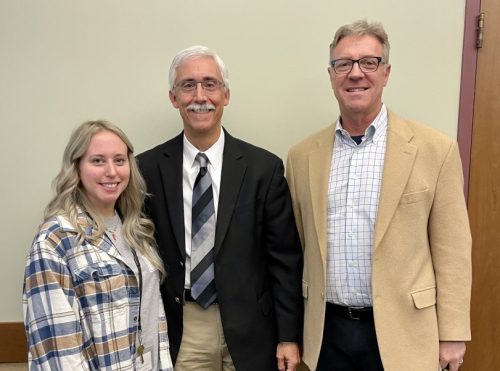RISE is excited to announce the Forensic Intensive Case Management (FICM) program! FICM assists justice-involved individuals with mental health struggles to secure needed services and interventions to avoid incarceration and hospitalization. The target population for this program are individuals identified by the criminal justice system, either pre-or-post-booking, who have mental health needs and who require the intensive support of specialized care managers to avoid future incarceration or hospitalization.
The Goal of FICM is to reduce recidivism by addressing underlying mental health issues.
The FICM program began providing services in February of this year. Currently there is one individual receiving case management services through FICM. Referrals have been received and approved for five additional incarcerated individuals, for whom external planning has begun in preparation for intake which will be scheduled closer to their release dates.
 “The Goal of FICM,” says Victoria Furfaro, Community Outreach Program Director, “is to reduce recidivism by addressing underlying issues of individuals being released with mental illnesses. The program is geared towards individuals with a history of lack of compliance, and we hope the FICM approach will lead to increased compliance. Our goal is to keep individuals engaged in services to assist them in remaining complaint with the court and to prevent their rearrests and ending up back in jail, as well as helping them reduce the number of emergency services they may require.”
“The Goal of FICM,” says Victoria Furfaro, Community Outreach Program Director, “is to reduce recidivism by addressing underlying issues of individuals being released with mental illnesses. The program is geared towards individuals with a history of lack of compliance, and we hope the FICM approach will lead to increased compliance. Our goal is to keep individuals engaged in services to assist them in remaining complaint with the court and to prevent their rearrests and ending up back in jail, as well as helping them reduce the number of emergency services they may require.”
To maintain engagement, the FICM case managers focus on building a good rapport with the individuals they work with. “What I’ve learned through my education and my experience working as a Saratoga Springs Community Outreach Court Coordinator,” Victoria explains, “is that 80% of client success is based on the relationship with the provider. The way we provide services is different, from the more formal legal services these individuals typically face when released from jail. It is informal, personable, and person centered. The FICM case managers, who have many connections with community service providers, meet the individuals in out the community – wherever they are at – rather than them coming to us. We have at least six contacts with them per month with the goal of connecting and assisting these individuals to maintain services with community service providers.”
This approach has proven successful in the Saratoga Springs Community Outreach Court

This approach has proven successful through the work that Victoria’s team has done in the Saratoga Springs Community Outreach Court, which began in November of 2020. The program has a 72% court order compliance success rate.
The FICM program is patterned after the Rochester Forensic Assertive Community Treatment program (RFACT) – an outpatient treatment program to reduce recidivism and promote recovery among justice-involved adults with a serious mental illness. Findings from studies of the individuals who received services from RFACT have shown significantly fewer convictions for new crimes, significantly fewer days spent in jail, as well as significantly fewer days spent in the hospital.
Dr. Michael Prezioso, PhD, the Commissioner of the Saratoga County Department of Mental Health and Addiction Services, secured a one year grant through the New York Office of Mental Health (OMH) to pilot the FICM program with RISE. The RISE FICM program is one of 10 different pilot programs the NYS Office of Mental Health (OMH) has provided grants for throughout the state. An assessment will be conducted at the end of the year to determine the pilot’s effectiveness.
RISE worked closely with OMH to develop the structure of the program program. In February 2022, a systems mapping exercise was held with key stakeholders from around the county. These stakeholders met with experienced facilitators that help guide them through exercise which helped them to identify both strengths and gaps in the current system by creating a system “map” that details out how individuals with mental illness interact with various aspects of the mental health and criminal justice systems. They discussed the gaps in the system for individuals with mental illnesses coming out of jail and how to fill them, as well as how to reduce the high usage of emergency services by these individuals.
RISE met with RFACT in to discuss program structure, training, and implementation.
 RISE met with RFACT in July 2022 to discuss program structure, training, and implementation. In November 2022, Dr. Prezioso, in collaboration with RISE, presented a community-based Mental Health and Criminal Justice Collaboration training with instructors from RFACT, Dr. Steven Lamberti and Dr. Robert Weisman, experts in forensic psychiatry. The training focused primarily on criminology of individuals with mental health concerns, and rates of recidivism. It explored ways to further collaborate between law enforcement and mental health providers, the current approaches to incarceration diversion in Saratoga County, as well as a thorough safety training in relation to individuals with mental health concerns with multi-risk factors. Dr. Lamberti and Dr. Weisman provided books, videos, and other training materials that were used to help shape the FICM program.
RISE met with RFACT in July 2022 to discuss program structure, training, and implementation. In November 2022, Dr. Prezioso, in collaboration with RISE, presented a community-based Mental Health and Criminal Justice Collaboration training with instructors from RFACT, Dr. Steven Lamberti and Dr. Robert Weisman, experts in forensic psychiatry. The training focused primarily on criminology of individuals with mental health concerns, and rates of recidivism. It explored ways to further collaborate between law enforcement and mental health providers, the current approaches to incarceration diversion in Saratoga County, as well as a thorough safety training in relation to individuals with mental health concerns with multi-risk factors. Dr. Lamberti and Dr. Weisman provided books, videos, and other training materials that were used to help shape the FICM program.
Late in 2022, the FICM Advisory Review Committee was established. It meets twice a month to review and approve FICM referrals. The committee is comprised of stakeholders from various community and county agencies that provide mental health and addiction services in Saratoga County. The committee assesses each referral to determine the most appropriate level of service based on strengths, needs of the individual and the availability of program openings,
“What I like best about FICM,” Victoria shares, “is that it is flexible. I like that we can adapt it to the needs of Saratoga County based on the services available. We can make the Case Management plans person centered. And that there are no insurance or income requirements.”
Victoria has great hopes for FICM. “I hope it gets approved as a continuous program. I hope that the success and results will lead to more services for people in the legal system with mental illness. I hope it will lead to more programs such as reintegration.”
